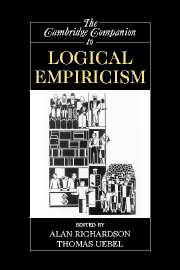Book contents
- Frontmatter
- Introduction
- Part I The Historical Context of Logical Empiricism
- Part II Logical Empiricism: Issues in General Philosophy of Science
- Part III Logical Empiricism and the Philosophy of the Special Sciences
- 7 The Turning Point and the Revolution: Philosophy of Mathematics in Logical Empiricism from Tractatus to Logical Syntax
- 8 Logical Empiricism and the Philosophy of Physics
- 9 Logical Empiricism and the Philosophy of Psychology
- 10 Philosophy of Social Science in Early Logical Empiricism: The Case of Radical Physicalism
- 11 Logical Empiricism and the History and Sociology of Science
- Part IV Logical Empiricism and its Critics
- Bibliography
- Index
- Series List
8 - Logical Empiricism and the Philosophy of Physics
from Part III - Logical Empiricism and the Philosophy of the Special Sciences
Published online by Cambridge University Press: 28 January 2008
- Frontmatter
- Introduction
- Part I The Historical Context of Logical Empiricism
- Part II Logical Empiricism: Issues in General Philosophy of Science
- Part III Logical Empiricism and the Philosophy of the Special Sciences
- 7 The Turning Point and the Revolution: Philosophy of Mathematics in Logical Empiricism from Tractatus to Logical Syntax
- 8 Logical Empiricism and the Philosophy of Physics
- 9 Logical Empiricism and the Philosophy of Psychology
- 10 Philosophy of Social Science in Early Logical Empiricism: The Case of Radical Physicalism
- 11 Logical Empiricism and the History and Sociology of Science
- Part IV Logical Empiricism and its Critics
- Bibliography
- Index
- Series List
Summary
INTRODUCTION
Moritz Schlick, Hans Reichenbach, Rudolf Carnap, Philipp Frank, Herbert Feigl, and Carl Hempel all studied physics at university. Relativity theory and quantum theory, the two revolutionary developments of twentieth-century physics, happily coincided with the rise and consolidation of logical empiricism. Yet the designation “philosophy of physics” was little used by the logical empiricists themselves, while, with notable exceptions, they produced little of what is currently understood under that head, viz., detailed investigations into particular aspects or interpretations of physical theories. Certainly, there are important works of Reichenbach's, a few of Schlick's, mostly from his pre-Vienna days, and one or two others, recognizably belonging to philosophy of physics. Nonetheless, it is something of an anachronism to speak of logical empiricism's “philosophy of physics”.
One reason is that logical empiricist orthodoxy allotted but a narrow window to the legitimate practice of “scientific philosophy”. Carnap's 1934 declaration that “we pursue Logical Analysis but no Philosophy” is perhaps characteristic (Carnap 1934a, 28, emphasis in original). Frank, a working physicist, warned that philosophical deliberation continually posed the threat of becoming an “opium for science” (Frank 1932, viii/1998, 11), and that the very meaning of the term “philosophy of natural science” was to be sharply demarcated from all manner of “school philosophy”.
- Type
- Chapter
- Information
- The Cambridge Companion to Logical Empiricism , pp. 193 - 227Publisher: Cambridge University PressPrint publication year: 2007
- 4
- Cited by

